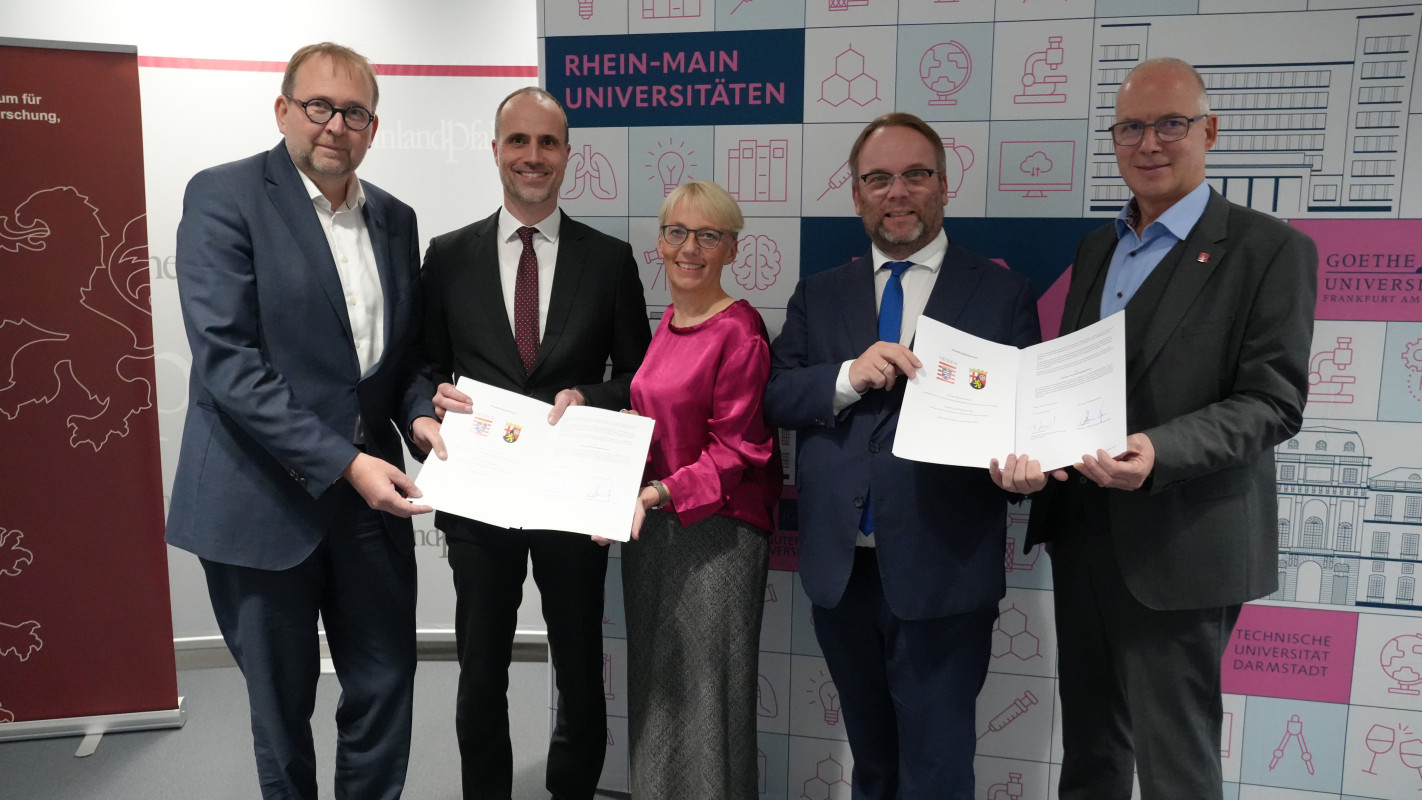Hesse und Rhineland-Palatinate sign administrative agreement to strengthen the alliance of the Rhine-Main Universities
Photo: MWG
Joint press release from HMWK, MWG, and RMU
Yesterday, the science ministers of Hesse and Rhineland Palatinate, Timon Gremmels and Clemens Hoch, signed an administrative agreement in Mainz. Its aim is to further promote unbureaucratic cooperation between Goethe University Frankfurt, Technical University of Darmstadt and Johannes Gutenberg University Mainz and to further facilitate cross-border projects in the future. After having cooperated for decades, The three universities, which have closely cooperated for decades, officially joined forces as the alliance of the Rhine-Main Universities (RMU) in 2015.
“The RMU alliance is a driving force for innovation, creates new opportunities for young talent and strengthens the international competitiveness of our Rhine-Main region”, says Hessian Science Minister Timon Gremmels. “Alliances such as the RMU are important in the science context because they bring together the individual strengths of the universities and thus create unique synergies. From a political standpoint, the task is to establish the right framework conditions for this. With this administrative agreement, we are taking a big step forward; the agreement enables the universities to cooperate even more efficiently and with less bureaucracy across state borders.”
“We will continue to actively support the RMU’s development in the future. If it turns out that a further harmonization of the RMU partner universities’ legal framework is useful, we intend, prospectively, to enter into a state treaty between Rhineland-Palatinate and Hesse for this purpose. First of all, we will support the RMU on its way to becoming a University Excellence Consortium. We want to take this unique opportunity to make the RMU an absolute beacon on an international level”, adds Rhineland-Palatinate Science Minister Clemens Hoch.
The administrative agreement facilitates the funding of joint activities. It enables the three universities to contribute funds from basic state funding to the RMU alliance. The universities are free to decide on the amount of funds that are to be contributed in equal shares. The funds serve to implement measures that support the further development and performance of the RMU and can be used flexibly at the three universities.
The agreement also lays the foundation for harmonizing the university entry requirements for students using the RMU course offers (RMU Study Program or joint degree programs). Furthermore, with the agreement, Hesse and Rhineland-Palatinate signal their intention to prospectively enter into a state treaty in order to enable an even greater harmonization of the alliance partners’ legal framework. They also intend to harmonize supervisory and approval processes, for example in the area of data protection, to eliminate duplication of supervisory and approval processes, where possible.
The agreement is yet another sign of the strong political support from the state parliaments. A couple of weeks ago, the state parliaments in Hesse and Rhineland-Palatinate unanimously approved two identically worded resolutions to strengthen the Rhine-Main area as a cross-border region of science, emphasizing their support for the active further development of the RMU.
Prof. Dr. Enrico Schleiff, President of Goethe University Frankfurt and current RMU spokesperson, says: “After the passing of the resolutions in the state parliaments, the signing of the administrative agreements is another strong political signal for us as the RMU that serves as a confirmation of the close cooperation between our three universities over the last decades. The political backing and the harmonization of framework conditions and processes in various areas is a great support for us with regard to our future endeavors – also in view of the RMU’s joint proposal as a University Excellence Consortium in the Excellence Strategy of the German federal and state governments. Then years after we formalized our alliance, the prospect of a state treaty signals the beginning of a new area for the RMU.”
Prof. Dr Tanja Brühl, President of TU Darmstadt, emphasizes: “As RMU, we design and shape top-level research, attractive teaching offers and intensive networking with businesses and society in the cross-border Rhine-Main Metropolitan region. The administrative agreement now concluded creates new opportunities for our strong alliance to further deepen our cooperation while, at the same time, making it easier, faster and more efficient. As RMU, we will make use of the chances offered by the agreement and will continue to actively develop innovative and ground-breaking solutions for the challenges of tomorrow.”
Prof. Dr. Georg Krausch, President of Johannes Gutenberg University Mainz, adds: “With the administrative agreement, Hesse and Rhineland-Palatinate, as the home states of our universities, recognize the longstanding and successful cooperation of our strategic alliance. We are proud of that because we as the RMU recognized early on that cooperation in science becomes more and more important and that the pooling of our complementary strengths increases our scientific performance. The new agreement creates the basis for us to jointly strengthen the Rhine-Main region of science even further and to increase its international visibility and attractiveness.”
The strategic partnership of Goethe University Frankfurt, Technical University of Darmstadt and Johannes Gutenberg University Mainz has existed since 2015. In total, the three universities have 95,000 students and 1.500 professors. The universities cooperate intensively in almost all areas – from joint research projects and degree courses to cooperatively used infrastructure and coordinated recruitment of researchers. In research, there are numerous joint focus areas, for example in life sciences and medicine, digital transformation and artificial intelligence, as well as particle physics and material and energy research.
Currently, the RMU is preparing its proposal in the Excellence Strategy of the German federal and state governments for funding as “University Consortium of Excellence”. In the event of success, the RMU would receive an additional 28 million euros per year from 2027 onwards. The previous round of competition for the Clusters of Excellence already was a great success for the RMU: The universities were able to obtain funding for a total of five Clusters of Excellence, which, starting in 2026, will receive federal and state funds in the three digit millions.




